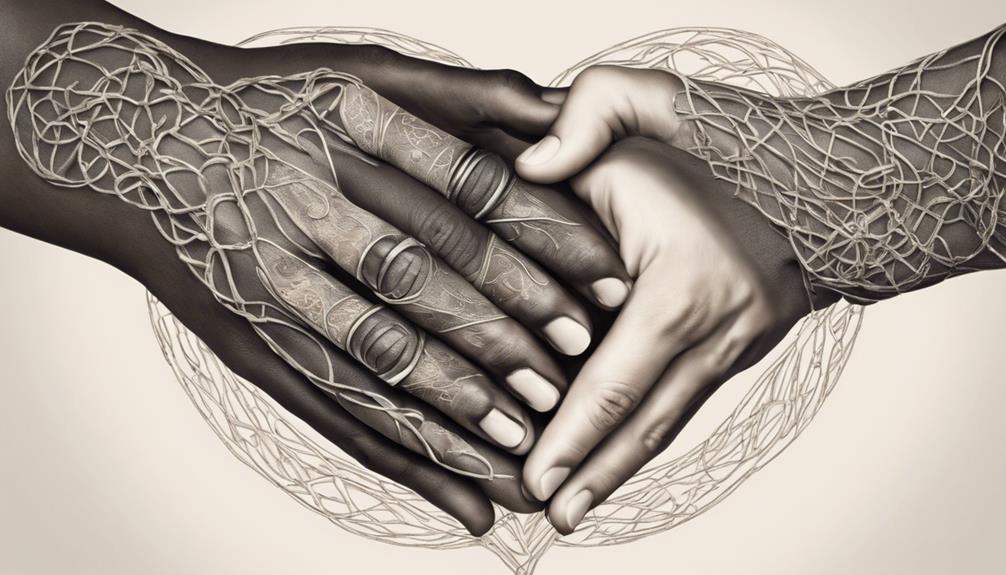As we explore the challenges of deciding between ethical non-monogamy and swinging, it’s interesting to see that a survey from a reputable relationship institute showed that 67% of people experienced better communication skills and increased self-awareness while involved in consensually non-monogamous relationships.
When contemplating which path to embark on, it's essential to ponder not only the physical aspects but also the emotional implications of each choice. By acknowledging the nuances of these relationship dynamics and understanding how they align with our values and aspirations, we can embark on a journey of self-discovery and relationship growth.
Key Takeaways
- Consider the level of emotional connection desired: ENM for deeper emotional bonds, swinging for shared sexual experiences.
- Evaluate comfort with boundaries and agreements: ENM requires clear relationship structures, swinging focuses on sexual sharing boundaries.
- Reflect on personal growth and satisfaction: ENM fosters self-discovery through emotional connections, swinging emphasizes physical satisfaction and exploration.
- Prioritize communication and understanding: Both ENM and swinging require open communication, empathy, and respect for partners' feelings.
Key Differences and Similarities
When exploring the distinctions and parallels between ethical non-monogamy (ENM) and swinging, it's crucial to understand the fundamental differences in their approaches to multiple-partner relationships.
In ethical non-monogamous relationships, the emphasis lies on forming emotional connections and love with multiple partners, allowing individuals to explore diverse forms of intimacy and connection.
On the other hand, swinging primarily revolves around sexual experiences with other couples, focusing more on the physical aspect of relationships rather than emotional bonds.
Clear boundaries and agreements are essential in both ENM and swinging, but while swinging tends to maintain these boundaries for sexual encounters, ENM can involve deeper emotional involvements and various relationship structures beyond just physical interactions.
ENM enables individuals to build intimate connections based on consent and openness, emphasizing personal growth and authenticity within relationships. This distinction highlights how the nature of emotional connections differs significantly between the two relationship dynamics.
Relationship Dynamics and Expectations

In ethical non-monogamous relationships, individuals navigate multiple romantic connections while swinging involves sharing sexual experiences with established boundaries and varying levels of intimacy. Understanding the relationship dynamics and expectations in each dynamic is essential.
Ethical non-monogamy emphasizes emotional connections and the possibility of having multiple romantic partners, requiring clear boundaries, open and honest communication, and agreements on commitment levels and interaction boundaries. On the other hand, swinging focuses on sexual sharing and swapping experiences, which can enhance sexual energy and connection within relationships.
It involves establishing boundaries for intimacy levels and exploring different interactions with consent and communication at the forefront. By considering these aspects, individuals can determine which relationship dynamic aligns best with their values, desires, and comfort levels, ensuring a fulfilling and mutually respectful experience within ethical non-monogamy or swinging.
Emotional Considerations and Boundaries
Navigating emotional considerations and setting boundaries is crucial when exploring ethical non-monogamy or swinging dynamics. When delving into these relationship styles, it's essential to carefully consider the following:
- Emotional Connections: In ethical non-monogamy, emotional bonds are often valued as much as physical intimacy, whereas swinging tends to prioritize sexual experiences over emotional involvement.
- Clear Boundaries: Establishing transparent emotional boundaries is vital in ethical non-monogamy to ensure that partners' emotions and well-being are respected throughout the journey.
- Partner's Feelings: Being attuned to your partner's emotions and reactions is key in both ethical non-monogamy and swinging to maintain a healthy and respectful dynamic.
- Balance: Finding the right equilibrium between emotional intimacy and sexual exploration is crucial when deciding which approach aligns best with your relationship values and desires.
Understanding and addressing these emotional considerations and boundaries can lead to more fulfilling and respectful experiences in both ethical non-monogamy and swinging dynamics.
Communication Strategies and Tools

Utilizing active listening and empathy is essential for fostering meaningful connections and understanding within both ethical non-monogamy and swinging dynamics.
In ethical non-monogamy, open communication about emotional connections and addressing jealousy, insecurities, and fears with partners is crucial. This type of relationship thrives on honesty and vulnerability, requiring partners to express their desires and concerns openly.
On the other hand, swinging communication revolves around setting clear boundaries and agreements regarding sexual experiences with others. It's vital to have honest discussions about desires, preferences, and comfort levels with all parties involved in swinging dynamics.
Tools like active listening and empathy play a significant role in navigating through the complexities of these relationships. By actively listening to each other's needs and showing empathy towards insecurities and fears, partners can strengthen their bond and create a safe space for open and honest communication.
Personal Growth and Satisfaction
Let's explore how personal growth and satisfaction can differ in ethical non-monogamy versus swinging dynamics.
- Personal Growth: Ethical non-monogamy fosters personal growth through the development of emotional connections and the exploration of diverse relationship dynamics, allowing individuals to learn more about themselves and their partners.
- Emotional Connections: Ethical non-monogamy prioritizes deeper emotional connections, encouraging self-discovery and a profound understanding of one's desires and boundaries within relationships.
- Physical Satisfaction: Swinging, on the other hand, focuses more on physical satisfaction and sexual exploration within clear boundaries and agreements, offering a different avenue for fulfillment in relationships.
- Self-Discovery: While swinging may provide sexual variety and excitement, ethical non-monogamy can lead to a deeper sense of self-discovery and intimacy through the cultivation of meaningful emotional connections with multiple partners.
In choosing between these relationship styles, consider whether you value emotional depth and self-discovery or prioritize physical experiences and sexual variety in your pursuit of personal growth and satisfaction.
Frequently Asked Questions
What Is the Difference Between Swinging and Non-Monogamy?
When considering the difference between swinging and non-monogamy, it's essential to recognize that swinging typically involves sexual activities with other couples, focusing on physical intimacy without deep emotional connections.
On the other hand, non-monogamy encompasses various relationship structures beyond just sex, such as polyamory and open relationships, emphasizing emotional bonds and diverse dynamics.
Understanding these distinctions can help navigate which path aligns best with individual desires and boundaries.
How Do You Know if Ethical Non-Monogamy Is Right for You?
When considering ethical non-monogamy, we explore our desires for multiple connections while prioritizing honesty and respect. Understanding our comfort with sharing emotions and setting boundaries can guide us.
Open communication and empathy play crucial roles in building fulfilling relationships. By embracing transparency and personal growth, we navigate the complexities of non-monogamy.
Ultimately, knowing if it's right for us involves introspection and a willingness to explore new relationship dynamics with care and consideration.
Is Swinging Ethical Non-Monogamy?
Swinging falls under the umbrella of ethical non-monogamy, emphasizing shared sexual exploration within couples. It involves consensual experiences with others, prioritizing clear boundaries and open communication.
While swinging focuses on joint sexual encounters, ethical non-monogamy encompasses a wider range of emotional connections. Understanding these distinctions can help navigate which approach aligns best with individual relationship dynamics and desires.
Why Do People Choose Ethical Non-Monogamy?
When we talk about why people choose ethical non-monogamy, it's all about embracing personal growth and open communication. It allows us to explore our needs and desires while respecting others.
The foundation lies in mutual consent and transparent honesty, fostering connections based on understanding and respect.
Choosing ethical non-monogamy means valuing genuine communication and building relationships on trust and openness.
What are the key differences between Ethical Non-Monogamy and Polyamory when considering different relationship options?
When considering relationship options, it’s important to understand the ethical nonmonogamy vs polyamory differences. Ethical nonmonogamy typically focuses on honesty and consensual agreements, while polyamory involves multiple loving relationships. Both allow for non-exclusive partnerships, but the emphasis on love versus physical connections varies.
Conclusion
As we navigate the complexities of ethical non-monogamy and swinging, it's essential to remember that our choices reflect our values, desires, and boundaries. By embracing open communication, setting clear expectations, and prioritizing emotional well-being, we can create fulfilling and authentic relationships.
Just as a compass guides us through uncharted waters, let our hearts lead us towards the connections that nurture our souls and bring us joy. Choose wisely, with compassion and courage.









